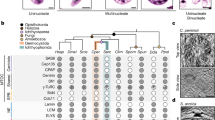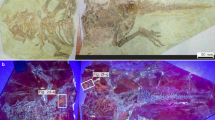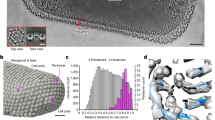Abstract
OUR observations1 show that sponge species of distant taxonomic position, even if they belong to different classes such as Calcispongiae and Demospongiae, may form bispecific cell aggregates after dissociation.
This is a preview of subscription content, access via your institution
Access options
Subscribe to this journal
Receive 51 print issues and online access
$199.00 per year
only $3.90 per issue
Buy this article
- Purchase on Springer Link
- Instant access to full article PDF
Prices may be subject to local taxes which are calculated during checkout
Similar content being viewed by others
References
Sarà, M., Liaci, L., and Melone, N. (preceding communication).
Wilson, H. V., J. Exp. Zool., 11, 281 (1911).
Segedi, R., and Kelly, W. E., Res. Rep. Fish. Wildlife Serv., 63 (1964).
Curtis, A. S. G., Nature, 196, 245 (1962).
Garber, B., and Moscona, A. A., J. Exp. Zool., 155, 179 (1964).
Harris, H., and Watkins, J. F., Nature, 205, 640 (1965).
Harris, H., Nature, 206, 583 (1965).
Author information
Authors and Affiliations
Rights and permissions
About this article
Cite this article
SARÀ, M., LIACI, L. & MELONE, N. Mixed Cell Aggregation between Sponges and the Anthozoan Anemonia sulcata. Nature 210, 1168–1169 (1966). https://doi.org/10.1038/2101168a0
Issue Date:
DOI: https://doi.org/10.1038/2101168a0
This article is cited by
Comments
By submitting a comment you agree to abide by our Terms and Community Guidelines. If you find something abusive or that does not comply with our terms or guidelines please flag it as inappropriate.



